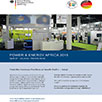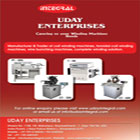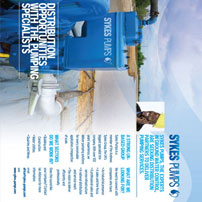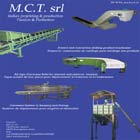

M a r k e t N e w s
Ethiopia: Boosting Energy to Combat Development Challenges
Posted on : Tuesday , 13th September 2016
A large number of people in developing countries are still poor, undernourished, and with no adequate health-care facility. They don't have access to clean water, and are facing challenges such as in alleviating climate change and in enhancing their development processes.
Both the environmental and development challenges are coming together to hurt the poor of developing countries as well as the world at large. Thus, developing countries like Ethiopia need a new economic and environmental scheme to tackle both climate change and development challenges.
The current economic model, which is just copied from the American and European, could neither solve the developmental nor the environmental challenges. Hence, developing countries need a new economic model, which not only serves the larger poor and the vulnerable but also ensures to protect the environment.
In Ethiopia, about 20 per cent of the total population is poor, and with no access to electricity. The poor is also affected by diseases. The forest coverage was 40 per cent in Ethiopia at one point in time. But currently, it is about 10 per cent. This indicates that the forest coverage has been lost in the effort to utilize the forest resources for cooking and construction purposes.
The destruction of forest also leads to soil erosion and loss of soil fertility. That in turn affects ground water boost undesirably. Hence, when there is high run off, the agriculture sector will suffer a lot.
Ethiopia must develop using its large number of renewable energy potentials. Recognizing the fact, Ethiopia has been building small, medium and large dams. This could help the country harness its resources and provide electricity for its people abundantly.
Though Ethiopia is rich in sunshine and wind, the country needs to promote hydro-power and wind-generated energy to provide electricity for the people.
In any case, generating electricity is still not sufficient, it needs to promote something like social forestry. Indeed, there are two kinds of forestry development approaches. One is conservation of forest for environmental reasons and the other is social forest where you grow trees because you cut trees for different purposes. We all need trees. We need wood for cooking foods, making furniture, and for various other purposes. So, Ethiopia should have a programme of social forestry where the people grow their own trees and for their demand.
This is the way Ethiopia has to move. Developing countries do not need to follow American way of using gas to cook food. Gas is fossil fuel and would cause to bring climate related disasters. Ethiopia has the opportunity to move to renewable energy sources such as hydro-power, wind energy, and social forestry, to meet the needs of the poor and to meet environmental and developmental needs.
Consequently, developing countries should look into different solutions; and do not have to copy the model from developed countries. They have the opportunity to develop various sources in a friendly manner.
Any countries want development because they want to be happy, to prosper, to proceed, and need our environment to be sustainable so that our development lasts not only for us but also for our children in the future.
Our forefathers both in Ethiopia used the environment abundantly, and they preserved the environment properly. But, the current concern is on the economic development only.
Such problems are not only confined to Ethiopia, these are everywhere in developing countries. That is governments at all levels have to reconsider and take steps. Individuals, farmers, students, teachers, government, donor society and all others who support development, should provide emphasis to the environment.
In doing so, the concerned bodies would understand the linkages between development and environment. When understand the impacts of development they would reduce the negative impacts.
To curb the challenges of climate change and development, knowledge, understanding and research are needed. Researches should be done locally on local environmental systems. Knowledge coming from Europe or anywhere else may not be directly applicable to Ethiopia. What we need is to understand our own system here in the highland Ethiopian agriculture. When we develop our agriculture, we can develop our business, and keep our local environment safe and sustainable.
Every stakeholder ought to make efforts to incorporate environment and development together and to take development to the general public especially to the farmers in the villages of Ethiopia who are producing food.
Though this agricultural productivity has been bolstering by small farmers scattered all over Ethiopia, they need support, and input. This input comes from governmental or other non-governmental organizations. Governments should acquire fundamental understanding about the causes and effects of environmental degradation, and on the ways of developing the agriculture productivity.
Of course, energy is a very important issue. The villagers do not get enough electricity or fossil fuel. Thus, they depend on biomass energy which comes from wood and forest. They are obliged to utilize forest and wood that causes deforestation. They need safe and clean energy.
Ethiopia has rich energy sources from its many rivers. Its rivers are potential source of hydroelectric energy. Although there may have very small hydroelectric projects undertaken in small courses with only 2000, 4000 megawatt usages, the energy from small units cannot supply full electricity service to all villages sustainably. Though biomass fuel comes from forest and agriculture waste, the villagers may not stop using biomass fuel for their social purposes.
Therefore, Countries would use these renewable energy resources to increase soil fertility and high agricultural production. In this regard, countries also need to look for energy from hydroelectric projects, solar and wind energy. Consequently, this would enable people stop using biomass energy, and reinforce Ethiopia to raise the people standard of living speedily.
On the other hand, education must meet the needs of the country. Students should have adequate facilities in the classrooms, as well as need to go to farms and industries to understand the basic knowledge. The Ethiopian education system also must meet the needs of the people.
Source : allafrica.com



































